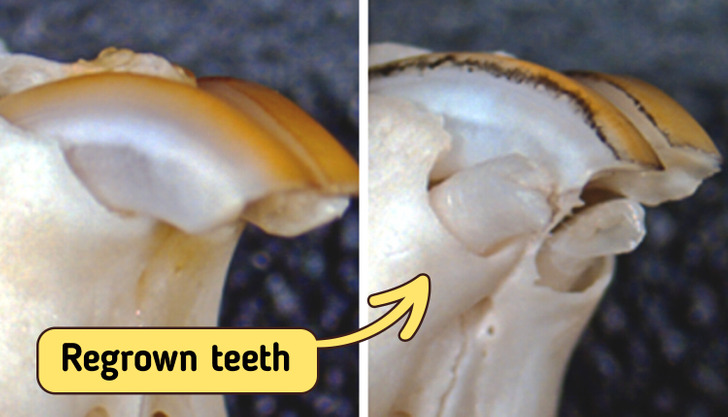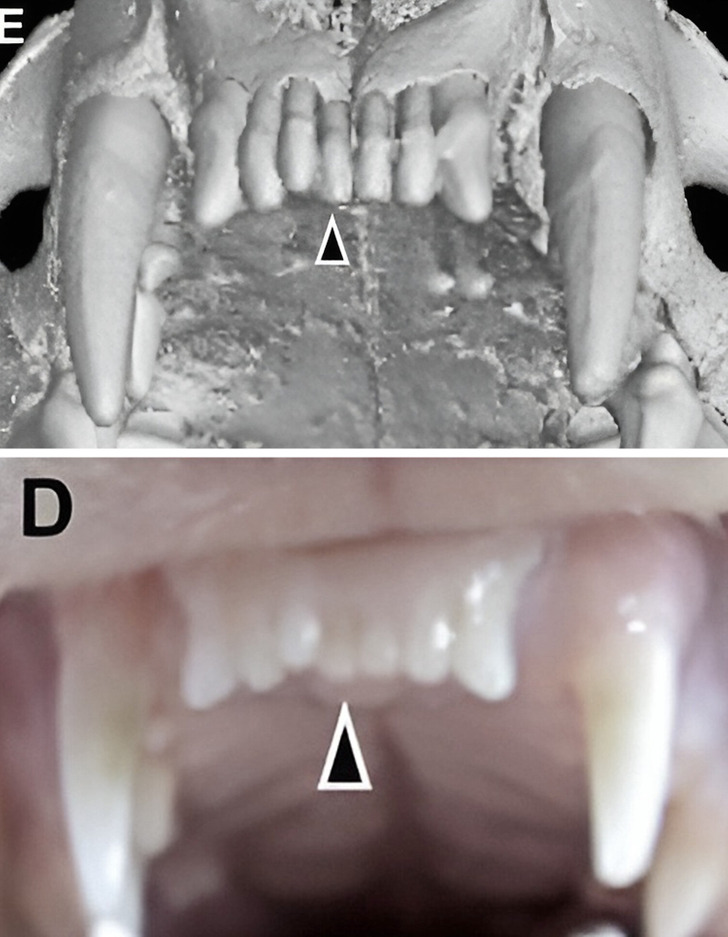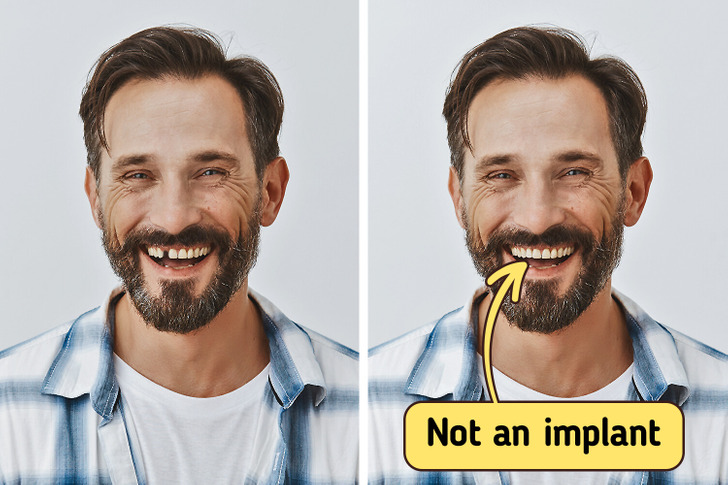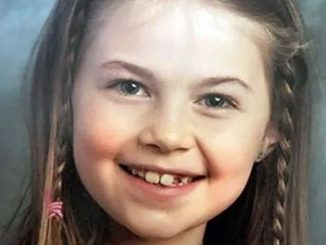The tooth fairy is a welcome guest for any child who has lost a tooth. Not only will the fairy leave a small gift under the child’s pillow, but they be assured of a replacement tooth in a few months. Unfortunately, the scenario is quite different for adults grappling with a loss of teeth. Luckily, there may be some hope thanks to a new study performed by scientists at Kyoto University and the University of Fukui.
A dental breakthrough
While the typical adult mouth houses 32 teeth, approximately 1% of the population exhibits variations of them, either possessing more or fewer teeth due to congenital conditions. Researchers have delved into the genetic factors behind cases of excessive teeth, seeking valuable insights into the potential regeneration of teeth in adults. This study is the first to show that monoclonal antibodies can help regrow teeth. It suggests a new way to treat a dental problem that currently requires implants and other artificial solutions.
A bit of science
The research team disclosed that an antibody targeting a specific gene, known as uterine sensitization-associated gene-1 (USAG-1), can induce tooth development in mice affected by tooth agenesis, a congenital condition. The findings were published in the journal, Science Advances.
As per Katsu Takahashi, a senior lecturer at the Kyoto University Graduate School of Medicine and one of the principal contributors to the study, the essential molecules crucial for the development of teeth have already been pinpointed. “The morphogenesis of individual teeth depends on the interactions of several molecules including BMP, or bone morphogenetic protein, and Wnt signaling,” says Takahashi.

On April 13, 2021, the University of Kyoto posted its first pic of newly-grown teeth in mice.
BMP and Wnt are involved in more than just tooth development; they affect the growth of organs and tissues early in the body’s development. Because drugs affecting them directly might have broad side effects, scientists are cautious. To find a potentially safer method, researchers focused on the gene USAG-1, thinking that aiming at factors countering BMP and Wnt specifically in tooth development could be more precise.
“We knew that suppressing USAG-1 benefits tooth growth. What we did not know was whether it would be enough,” added Takahashi.
The first results
Scientists looked at how different monoclonal antibodies affect USAG-1. Monoclonal antibodies are often used to treat things like cancer and arthritis and for making vaccines. Tests with this antibody showed that BMP signaling is crucial for deciding the number of teeth in mice. Also, just one treatment was enough to grow a whole tooth. Further tests confirmed these positive results in ferrets too.
“Ferrets are diphyodont animals with similar dental patterns to humans. Our next plan is to test the antibodies on other animals, such as pigs and dogs,” explained Takahashi.

Fully regrown frontal teeth in ferrets
The next steps

Now, scientists are going to test the drug on healthy adults. If that goes well, the team plans to try it on kids aged 2 to 6 with a rare tooth problem called anodontia, a genetic disorder defined as the absence of all teeth. These kids will get one shot of the drug to see if it makes their teeth grow. If everything works out, the medicine might be approved by 2030.
Takahashi sees the new medicine as an additional choice for individuals who are missing some or all of their teeth.
“The idea of growing new teeth is every dentist’s dream,” Takahashi told the Japanese newspaper, The Mainichi in June this year. “I’ve been working on this since I was a graduate student. I was confident I’d be able to make it happen.”
So hopefully, by the year 2030, humans will get a chance to have their third generation of teeth grown and say goodbye to implants. Until then, make sure to keep your teeth strong and healthy — this article will help you with that.
Preview photo credit KyotoU_News / Twitter
Minha sogra me culpa por trair o filho dela, teste de DNA diz que o verdadeiro escândalo não foi meu – História do dia

A sogra de uma mulher a acusou de traição e disse que seu marido não poderia ser o pai da criança. Um teste de DNA provou que ela estava errada, mas também revelou a verdade mais surpreendente que ninguém esperava.
“Você é uma va-” minha sogra, Georgia, olhou com desdém. Mas meu marido, Hans, interrompeu-a antes que ela pudesse dizer o insulto.
“Mãe! Você não vai falar com minha esposa desse jeito. Peça desculpas agora mesmo!” ele exigiu depois da grande cena que sua mãe causou.
Georgia e meu sogro, Manny, vieram conhecer nosso filho pela primeira vez desde que ele nasceu no hospital. Eles só o viram de relance na sala de parto, mas pedimos a toda a nossa família que nos dessem tempo, como apenas três de nós, para criar laços e nos acostumar com essa nova e linda realidade.

Apenas para fins ilustrativos | Fonte: Pexels
Mas um mês se passou, e convidamos pessoas. Finalmente chegou a hora de Georgia e Manny virem, e embora eles tivessem se comportado no hospital, eu estava com medo. Minha sogra nunca gostou muito de mim, e me criticar era seu passatempo favorito, aparentemente.
“Espere um minuto, o sangue de Hans é B+? Como é que eu nunca soube disso?” ele perguntou, olhando para o filho dela e para a esposa.
No entanto, não consegui impedi-los de vir, principalmente porque outros já tinham postado fotos nas redes sociais com meu bebê. Portanto, Hans os convidou, e era para ser uma ótima noite.
Eu sabia que algo estava estranho assim que ela entrou pela porta. Tentei ser educado e ofereci a ela um tempo com Hans Jr., mas as coisas rapidamente se desfizeram, pois Georgia se recusou a fazer isso.
Ela balançou a cabeça e deixou escapar: “Eu sabia. Eu sabia! Eu sabia! Eu sabia!”
“O que você sabia, mãe? O que está acontecendo?” Hans perguntou, confuso. Ele me olhou de soslaio como se eu tivesse as respostas, mas eu estava igualmente atordoada com a explosão dela.
“Aquele bebê não é meu neto! Hans, me escute. Você não é o pai! Barbara está claramente te traindo! Olhe para ele! O nariz dele é completamente diferente, e o tom de pele dele não é como o da nossa família!” Georgie continuou, e eu não consegui mais manter minha cara de pôquer.

Apenas para fins ilustrativos | Fonte: Pexels
“Como é?”, perguntei, ofendido.
“Mãe! Isso é absurdo! Você não tem o direito de fazer tal acusação. Barbara nunca me traiu, e eu sei que esse bebê é meu filho. 100%!” Hans me defendeu, mas sua mãe estava com o rosto vermelho, e seu histrionismo estava prestes a piorar.
Ela começou a me insultar, mas meu marido a interrompeu, pedindo que ela se desculpasse novamente. Foi quando meu sogro se envolveu. Ela se acalmou e deixou o marido falar.
“Hans, ouça sua mãe. Ela tem uma certa intuição para essas coisas”, Manny sugeriu calmamente. Eu apenas balancei minha cabeça para o homem. Ele e eu nunca tivemos problemas, principalmente porque ele era quieto. Mas eu sabia com certeza que ele era o facilitador de sua esposa. Eu não tinha certeza se ele realmente acreditava que eu traí ou se ele estava apenas brincando.
“Pai! Como você pode dizer isso? Na nossa casa? Bem na frente da minha esposa?” Hans questionou, e eu reconheci a dor em sua voz. Ele queria que esse momento fosse especial, mas eles o tinham arruinado com essas acusações.
Manny levantou as mãos. “Há uma solução simples aqui. Você pode fazer um teste de DNA, e veremos a verdade”, ele continuou, balançando a cabeça como se fosse a opção mais simples do mundo. Eu ainda não conseguia acreditar, mas estava sem palavras.

Apenas para fins ilustrativos | Fonte: Pexels
“Não!”
“VOCÊ VAI FAZER ESSE TESTE IMEDIATAMENTE!”, sua mãe gritou depois de ficar em silêncio por apenas alguns minutos, e eu estremeci com isso.
“É isso. Saia da minha casa. Se você não quer conhecer seu neto, tudo bem para mim”, eu disse a eles e levei meu filho para a creche.
Ouvi mais alguns gritos, mas meu marido finalmente os fez ir embora. Quando o bebê adormeceu, fui para a sala de estar e conversamos um pouco. Concordamos que teríamos pouco contato com eles até que se desculpassem.
Infelizmente, minha sogra convenceu o lado dela da família de que eu tinha traído e que o bebê não era do Hans. Estávamos recebendo mensagens de todos. Alguns exigiam que fizéssemos um teste de DNA e outros me insultavam. Pessoas que eu nem conhecia faziam isso.
Eu finalmente desmoronei. Eu não aguentava mais. Eu também via a dor nos olhos do meu marido toda vez que ele ouvia uma notificação no meu telefone. “Vamos fazer isso. Vamos fazer o teste de DNA e calar todos eles de uma vez por todas”, eu disse a ele, e fizemos.

Apenas para fins ilustrativos | Fonte: Pexels
Não é de surpreender que Hans fosse obviamente o pai, mas tivemos que convidar os sogros para nossa casa mais uma vez para mostrar os resultados.
“Isso pode ser adulterado. O que você fez?” Georgia zombou de mim depois de passar os resultados para o marido.
“Eu não fiz nada. Hans levou o bebê sozinho para fazer o teste. Eu não estava lá”, suspirei.
“Mãe, aqui está o teste que você queria. Eu sou o pai. Agora, você pode parar com isso e aproveitar seu primeiro neto?” meu marido implorou, e embora ele tentasse esconder, eu sabia o quanto ele tinha sofrido. Eu a odiava por isso, mas eu seria civilizada pelo bem dele.
“Tudo bem”, ela disse, mas manteve os braços cruzados, sem olhar para o neto, que estava no berço da sala de estar que havíamos comprado. A cabeça de Hans caiu, e eu dei um tapinha em suas costas.
Mas Manny finalmente falou depois de analisar os resultados em silêncio por um tempo. “Espere um minuto, o sangue de Hans é B+? Como é que eu nunca soube disso?”, ele perguntou, olhando para o filho dela e para a esposa.
Hans deu de ombros. “Não sei.”

Apenas para fins ilustrativos | Fonte: Pexels
“Talvez você tenha esquecido ou tenha visto um resultado médico que acrescentou essa informação”, sugeri, mas Manny agora estava totalmente focado em sua esposa.
Minha sogra ficou quieta mais uma vez, mas seu sorriso de escárnio havia sido apagado. Ela estava nervosa. Era sutil. Mas eu podia perceber.
“Georgia, por que nosso filho é B+?” ele perguntou a ela lentamente. Hans e eu nos encaramos confusos.
“O que está acontecendo agora? O que importa meu tipo sanguíneo?”, ele perguntou aos pais, que se recusaram a reconhecê-lo.
Finalmente, Manny disse algo; seus olhos nunca se desviaram do rosto de sua esposa. “Porque sua mãe e eu somos O+. Logicamente, você não pode ser B+, mas aqui”, ele deu um tapa nos resultados de DNA com uma mão, “diz que você é. Então, estou perguntando à sua mãe. Georgia, o que isso significa?”
Meu queixo caiu tanto que pensei que poderia ter puxado um músculo. Nunca imaginei esse cenário em um milhão de anos. Meus olhos foram para Georgia, que estava olhando para o marido em silêncio e molhando os lábios nervosamente. Ela também estava torcendo as mãos. Finalmente, ela quebrou o contato visual com ele, fechou os olhos e confessou.

Apenas para fins ilustrativos | Fonte: Pexels
Hans não era filho biológico de Manny. Ela havia traído durante o casamento deles com um amigo da família. E finalmente, tudo fez sentido.
“É por isso que você me acusou, certo? Você estava projetando. Você pensou que eu era tão baixo quanto você”, eu disse, arqueando uma sobrancelha para ela. Senti a mão do meu marido no meu braço. Meu comentário foi um pouco duro e adicionou sal à ferida. Mas eu estava com tanta raiva. Eu não conseguia controlar.
Georgia começou a soluçar, entrando em seu típico histrionismo até que Manny se levantou e saiu. Ela o seguiu, e nós os deixamos em paz. Eles tinham muitos problemas para lidar, e quem iria querer se envolver?
“Você está bem?”, perguntei ao meu marido, abraçando-o por trás.
“Acho que sim. Bem, não sei como papai e eu lidaremos com isso, mas pelo menos não teremos que nos preocupar com nossas perguntas sobre nosso filho”, ele respondeu, mais calmo do que eu esperava.
“Ainda assim, é muita coisa para assimilar.”

Apenas para fins ilustrativos | Fonte: Pexels
“É, mas tanto faz. Nós ficaremos bem, e você e nosso bebê são tudo o que importa agora”, Hans acrescentou, virando-se e colocando os braços ao meu redor. Eu inclinei minha cabeça em seu peito e apenas absorvi tudo.
Se você está se perguntando sobre meus sogros? Bem, eles se divorciaram, e o resto da família descobriu o porquê. Foi um desastre colossal. Para piorar as coisas, Georgia começou a namorar seu parceiro de caso – o pai biológico de Hans – e tentou apresentá-lo a nós. Eles aparentemente mantiveram contato por anos, e ele sabia que era o pai de Hans. Loucura, certo?
Mas meu marido encerrou isso imediatamente. Decidimos cortar contato com ela definitivamente depois. Manny era seu pai. Ninguém mais. Mesmo que ele tivesse permitido sua esposa histérica por um longo tempo, ele estava farto dela e pediu desculpas a nós por sugerir o teste de DNA em primeiro lugar. Tudo estava bem conosco. Por enquanto, pelo menos.
Você nunca sabe o que pode acontecer em uma família.
O que podemos aprender com essa história?
- Não faça acusações se não tiver provas para sustentá-las. Georgia acusou Barbara de traição, mas as coisas se voltaram contra ela quando fizeram um teste de DNA. Ela estava projetando suas próprias inseguranças na nora, e seu casamento foi destruído para sempre.
- Família extensa pode ser complicada, e você precisa saber como diminuir ou cortar o contato. Não é fácil parar de falar com um membro da família, mas sua saúde mental e emocional é mais importante. Barbara e Hans fizeram a coisa certa ao cortar a mãe dele da vida deles.
Compartilhe esta história com seus amigos. Pode alegrar o dia deles e inspirá-los.
Se você gostou desta história, talvez goste desta sobre um homem mau que forçou sua sogra a vender sua casa e levou todo o seu dinheiro.
Este artigo é inspirado em histórias da vida cotidiana de nossos leitores e escrito por um escritor profissional. Qualquer semelhança com nomes ou locais reais é mera coincidência. Todas as imagens são apenas para fins ilustrativos.



Leave a Reply